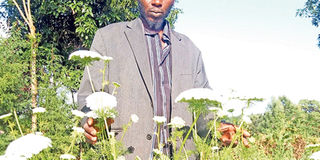Summer flowers for small farmer

Thomas Sang who farms flowers in Bomet County. He grows arabicum, ammi and mobydick, which have a ready market at the Thika-based Wilmar Flowers that exports the produce to the Netherlands. PHOTO | PETER CHANGTOEK | NMG
What you need to know:
- Sang, 44, grows an assortment of summer flowers in Chesoton village, an agribusiness he has engaged in since 2009, and has no intentions of switching to any other crop.
- Seeds for propagating mobydick on an acre go for Sh3,500, but Sang says he spends Sh1,000 for the 0.25 acres he grows on.
- Grade one are stems that measure 70cm in length, grade two 50cm and grade three 40cm. From an acre and when prices are good, one earns up a million shillings, says the farmer.
- ernard Lang’at, an agronomist in Bomet, say arabicum, mobydick, ammi visnaga, tuberosa and hypericum, are among flower varieties that do well in the county and in Kericho
Thomas Sang walks cautiously on his farm in Bomet County so that he does not damage the blooming plants.
Sang, 44, grows an assortment of summer flowers in Chesoton village, an agribusiness he has engaged in since 2009, and has no intentions of switching to any other crop.
“Many farmers in this region grow maize and tea but I have stuck with flowers which mature in about three months because they pay well and they have a ready market.”
He started with 0.3 acres, but has now expanded to some 0.6 acres to cash in on growing demand.
The flowers he grows at different times are arabicum, ammi and mobydick, which have a ready market at the Thika-based Wilmar Flowers that exports the produce to Netherlands.
“I also plant eryngiums,” says Sang, a father of five, who adds that he rotates and even intercrops the flowers with crops like potatoes, passion fruits, carrots and vegetables, to boost soil fertility and curb pests and diseases.
Seeds for propagating mobydick on an acre go for Sh3,500, but Sang says he spends Sh1,000 for the 0.25 acres he grows on.
“Mobydick seeds are tiny. For arabicum, which I currently grow on 0.3 acres, seeds look like onions and I spend Sh2,000 per sack,’’ says the farmer, adding that he uses approximately Sh6,000 as production costs.
Once the plants mature, they are harvested weekly every Friday and collected by the buyer. “I harvest and keep them outside the house under a shade,’’ he says, adding that the company requires best quality produce. They pay a day before the collection day.
Harvesting is done with precision as the length of the flower stems are specific. “For arabicum, I wait until they are 85cm long and each goes from Sh5 to Sh20, depending on market demand. Mobydick must be 70cm in length and each go for between Sh6 and Sh12.”
RELIABLE COMPANY
Arabicum flowers are graded according to length. Longer stems with blooms which are well developed are the best quality.
Grade one are stems that measure 70cm in length, grade two 50cm and grade three 40cm. From an acre and when prices are good, one earns up a million shillings, says the farmer.
“Sometimes I grow mobydick on 0.3 or 0.5 acres and I get Sh300,000,’’ reveals the farmer, noting space per plant is 50cm and inter-row 100cm.
Before joining the venture in 2009, Sang says with other farmers they used to grow artemisia and sunflower before an agronomist approached them and taught them in a field day at Kapkwen about farming flowers.
His challenge is attack on his crops by aphids and wilting, which happens in case of bad weather.
Bernard Lang’at, an agronomist in Bomet, say arabicum, mobydick, ammi visnaga, tuberosa and hypericum, are among flower varieties that do well in the county and in Kericho
He asks farmers to consider factors such as market, proper timing, capital, water supply, labour, and post-harvesting handling, before starting to grow farmers.
“Since the flowers are only for export, the farmer should ensure he gets reliable company through which he can sell his produce. He must get into contractual farming with the company.’’
According to the agronomist, the expected returns from arabicum on one acre is Sh850,000, while cost of production is Sh200,000. Expected returns from mobydick per acre is Sh700,000 and the cost of production is Sh150,000, while expected returns from ammi on one acre is Sh400,000 and the cost of production is Sh65,000.
The best season, he says, is from October-June, when prices are very high. “The farmer should time his flowers to be harvested between these months to maximise on returns,’’ the agronomist says, adding that prices are low between July and September.





